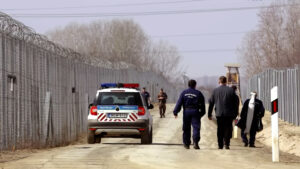INTRODUCTION
Hungary has faced substantial challenges regarding migration since the crisis began in 2015. As illegal border crossings surged, Hungarian authorities committed significant resources to protecting the country’s borders, a task that they argue benefits not only Hungary but the entire Schengen zone. Despite these efforts, tensions between Hungary and the European Union (EU) have escalated over migration policy, with Hungarian leaders voicing frustration over what they perceive as disproportionate penalties and a lack of support from Brussels.

A Burden Shared, But Unequally?
Hungarian officials have long emphasized the country’s role in safeguarding the EU’s southern border. According to Rétvári Bence, Hungary’s Ministry of Interior representative, Hungarian police and border guards have stopped over a million illegal border crossing attempts since 2015. These efforts, however, come at a significant financial cost. Border protection alone has cost Hungary approximately €2 billion (800 billion forints), with over 500,600 Hungarian police officers deployed in the Balkans and other operations focused on curbing illegal immigration.

However, Hungary’s contributions have not been met with the solidarity they expected. The European Court of Justice recently imposed a fine of €200 million on Hungary for violating EU asylum laws, claiming that the country restricted asylum rights. The European Commission followed this ruling with a payment request, which Hungary has refused to comply with, leading to further friction between Budapest and Brussels.
Diverging Views on Migration
Prime Minister Viktor Orbán has remained firm on his belief that migration should be handled by national governments, not as part of a collective EU policy. “Every country has its own approach to migration,” Orbán has said, highlighting how countries like Germany, France, and Italy have adopted more open policies, while Hungary has chosen to shut its doors to illegal migrants. Orbán maintains that a one-size-fits-all policy imposed by Brussels is not suitable for addressing the complexities of migration across Europe.

This stance stems from Hungary’s fear that uncontrolled migration could threaten national security, societal cohesion, and economic stability. The government sees its role as safeguarding its borders for the greater good of its citizens. In doing so, Hungary argues that it is also protecting the Schengen Area, a sentiment expressed by Hungarian officials who frequently cite security concerns as the primary reason for their stringent border policies.
Security Concerns on the Ground
The situation on Hungary’s borders, particularly its southern front, is far from calm. According to Kuczik János, the Deputy Chief of Hungary’s National Police, illegal migrants and smugglers are employing increasingly violent tactics. What began as attacks with sand and earth escalated to the use of stones, sticks, and even firearms. In one incident along the M5 highway in 2022, police were fired upon by smugglers, while a joint Hungarian-Serbian patrol faced gunfire from automatic weapons in another attack. These violent encounters underscore the risks faced by Hungarian authorities daily.

The migrant influx has also strained local resources in areas like Obrenovac, near Belgrade, where migrants from Afghanistan, Syria, and parts of Africa regularly emerge from nearby forests to gather supplies. Smugglers continue to exploit migrants, with prices for illegal passage through the region ranging from €1,000 to €2,000, depending on the destination. Such high demand for these dangerous journeys further complicates Hungary’s efforts to manage its borders.

Hungary’s Response to EU Demands
Hungarian leaders have expressed deep dissatisfaction with the EU’s handling of the migration crisis, accusing Brussels of forcing member states into policies that do not align with their national interests. As Rétvári Bence noted, while the EU constantly preaches solidarity on migration, Hungary has been left to shoulder the financial and security burdens alone. Bence even suggested that if Brussels insists on forcing Hungary to accept migrants, the country would offer these individuals a “free one-way trip to Brussels.”

Hungary views the recent fines imposed by the EU as punitive measures intended to coerce the country into complying with European-wide migration rules. According to officials, these fines fail to account for the billions of euros Hungary has already spent protecting its borders. The Secretary of State for the Interior has called the fines disproportionate and unjust, framing them as an attempt to pressure Hungary into adopting a pro-migration stance that the government and much of the population reject.
The Path Forward
Hungary’s government remains resolute in its belief that migration policy should be a matter of national sovereignty. Prime Minister Orbán continues to advocate for the right of individual EU member states to make decisions based on their own security, economic, and social needs. “Why should Brussels have the authority to force countries into decisions that affect their national integrity?” Orbán has argued.

For Hungary, the migration debate is not just about border security but about the very nature of its national sovereignty and identity. As the country faces mounting pressure from the EU, it stands firm in its commitment to a migration policy that prioritizes the safety and well-being of its citizens.
For more insights into Hungary’s migration policies and the challenges faced by authorities on the ground, watch our video: https://youtu.be/C2s7RxotHuI.
